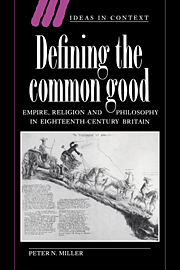Book contents
6 - ‘Alternatives’ to the common good 1774–1776
Published online by Cambridge University Press: 23 October 2009
Summary
The experience of empire had shown that it could not be managed according to the principles that had consolidated control of the state. France, Spain and England had overcome regional diversity because there was enough of an existing coincidence of interest among the regions for the application of power to create a concentrated entity. The union that had made Great Britain in the eighteenth century was less successful; overwhelming force had to persuade people of this community of interest. This was an ‘incorporation’ of a clearly junior partner. After the Seven Years War, the thirteen colonies in British North America resisted the extension of the dominance of parliament that was such a notable feature of British political life in the eighteenth century. Centralization and sovereignty coincided in the ideology and practice of early modern states. But the attempt to rule the empire as a part of the state was much less successful. The alternative, but rejected, ideology of representation, federalism and commonwealth offered a means of imperial governance that would probably have succeeded in maintaining a union, much as it did for the nineteenth–century British empire.
The search for a common good capable of uniting the efforts of a diverse population had taken on its especially early modern meaning in the context of the sixteenth–century civil wars of religion. Heterodoxy was dangerous, but so was persecution. The policies of the early modern states often oscillated between these poles. Generally, however, civil rulers felt secured by the support of powerful, though not all–powerful and certainly not autonomous, religious establishments.
- Type
- Chapter
- Information
- Defining the Common GoodEmpire, Religion and Philosophy in Eighteenth-Century Britain, pp. 349 - 412Publisher: Cambridge University PressPrint publication year: 1994



